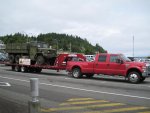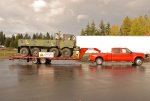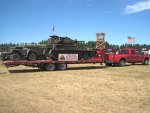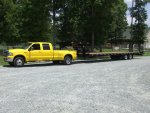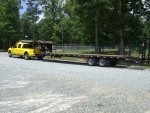Found this from FoMoCo- sure its CYA practice...but they did afterall design and build it. It's like the safety factors in chain or cable or even forklift capacitys...sure you're 5,000lb lift truck will lift 7,000lb but carry the steer wheels on a bump.
'If you're ever planning to tow a trailer with your vehicle -- whether it's a car, truck or SUV -- you should be aware of your gross combination weight rating, so you should probably start by learning the definition of a GCWR. A vehicle's GCWR is a specific weight determined by the manufacturer to be the maximum weight of a loaded tow vehicle and its attached loaded trailer. The total weight of the tow vehicle and trailer should never exceed the manufacturer's listed GCWR [source:
Ford Motor Company].
Similar to a vehicle's gross vehicle weight rating, or
GVWR, the gross combination weight rating is a specific maximum weight limit determined by the manufacturer. The major difference is that the GCWR takes into account two individual (yet attached) vehicles -- the tow vehicle and the trailer. However, the gross combination weight rating definition doesn't really state how the weight rating is calculated. According to Ford Motor Company, the GCWR is calculated by adding the following weights together: The vehicle's listed curb weight, allowable payload, driver and passenger weight and trailer weight [source:
Ford Motor Company].
It's important to remember that the GCWR is not an actual measurement of the weight of a tow vehicle and a trailer, but rather the combined maximum weight limit that the manufacturer has set for the two vehicles once attached.
The primary reason for setting a GCWR for any vehicle is safety. Overloading a tow vehicle or a trailer is dangerous enough. Overload both and you've really got a problem. Not only is a heavy load difficult to control on the road, but several other components could also be at risk. For example, the braking systems may overheat and fail, reducing or even eliminating the possibility of safely slowing or stopping your vehicle. The tires may not be able to handle the extra load, potentially causing a blow out situation. The engine and transmission in the tow vehicle may overheat due to the added strain, causing a mechanical failure. Components within the tow vehicle or trailer's suspension system could bend or even break, causing you to lose control on the road. The truth is that a variety of problems could result from overloading. Again, you should never surpass your vehicle's GCWR."
"




